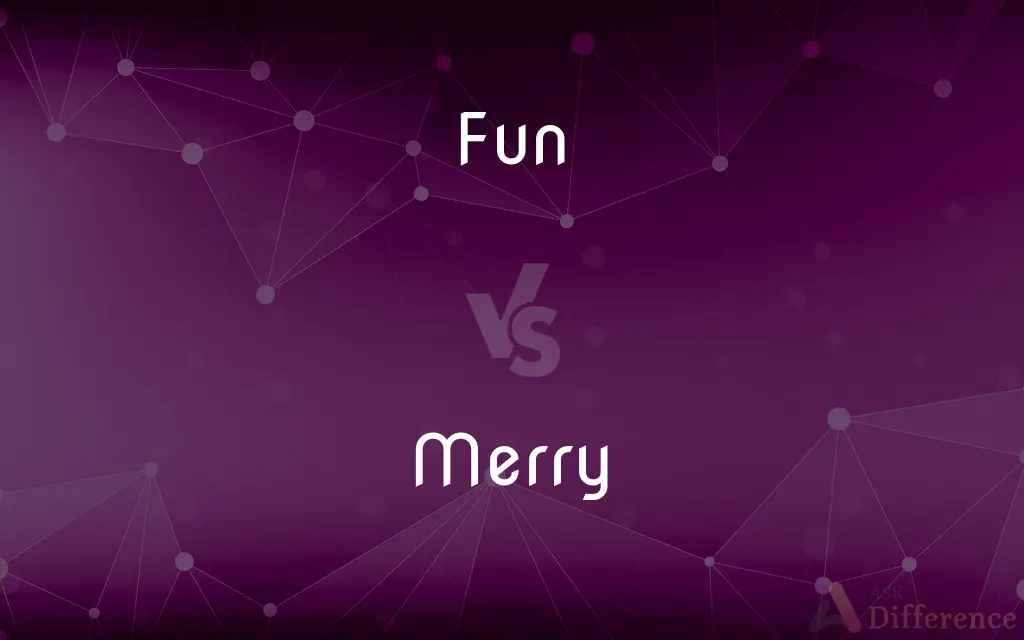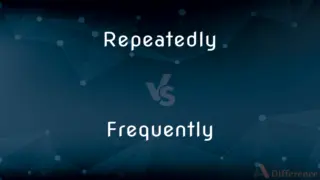Fun vs. Merry — What's the Difference?
By Fiza Rafique & Urooj Arif — Updated on April 15, 2024
Fun, typically associated with enjoyable activities or amusement, contrasts with merry, which connotes cheerfulness and joviality, especially in social settings.

Difference Between Fun and Merry
Table of Contents
ADVERTISEMENT
Key Differences
Fun is a broad term that refers to anything that provides amusement or enjoyment, often through activities or experiences. Whereas merry specifically describes a cheerful mood or festive atmosphere, often seen in social gatherings.
People seek fun to break from routine or relieve stress, engaging in various hobbies or entertainment. On the other hand, merry is commonly used to describe the spirited happiness people share during celebrations like Christmas.
Activities like games, sports, and watching movies are often considered fun because they are engaging and entertaining. Whereas, singing carols, sharing jokes, or toasting at a party are seen as merry, enhancing the communal joy.
The concept of fun can be subjective and varies greatly among individuals depending on their interests. Merry, however, universally involves light-heartedness and often laughter, linked to group dynamics.
Fun can be solitary or group-based, not necessarily requiring company, as one can have fun reading a book alone. In contrast, merry usually implies the presence of others, celebrating together.
ADVERTISEMENT
Comparison Chart
Definition
Enjoyment or amusement
Cheerfulness in a group
Usage Context
General activities
Festive or social settings
Emotional Connection
Can be solitary or communal
Usually communal
Examples
Playing video games
Christmas parties
Connotation
Broadly positive
Specifically joyful and festive
Compare with Definitions
Fun
An amusing, entertaining, or enjoyable experience.
The amusement park was a lot of fun.
Merry
Full of cheerfulness or gaiety; joyous in disposition or spirit.
The merry laughter filled the room.
Fun
Activities that are enjoyable or amusing.
We have various fun activities planned for the summer.
Merry
Marked by festivity or gaiety; having a festive atmosphere.
They hosted a merry gathering for the holidays.
Fun
Enjoyment, amusement, or lighthearted pleasure.
She finds fun in solving complex puzzles.
Merry
Quick and energetic; lively.
His merry demeanor makes him popular at social events.
Fun
Playful behavior or good humor.
They added a bit of fun to the meeting with their jokes.
Merry
Characterized by cheerfulness and lively activity.
The streets were merry with holiday shoppers.
Fun
A source of fun.
His witty remarks are always great fun at parties.
Merry
Causing happiness or laughter; festive.
The play was a merry success among the audience.
Fun
Fun is defined by the Oxford English Dictionary as "Light-hearted pleasure, enjoyment, or amusement; boisterous joviality or merrymaking; entertainment". Although particularly associated with recreation and play, it may be encountered during working time.
Merry
Full of cheerfulness, liveliness, and good feelings
Merry revelers.
Fun
Enjoyment, amusement, or light-hearted pleasure
The children were having fun in the play area
Merry
Marked by or offering fun, good feelings, and liveliness; festive
A merry evening.
Fun
Amusing, entertaining, or enjoyable
It was a fun evening
Being on set with the cast and crew was really fun
Merry
Brisk
A merry pace.
Fun
Joke or tease
They are just funning you
No need to get sore—I was only funning
Merry
(Archaic) Delightful or pleasing.
Fun
Enjoyment; amusement
We had fun at the beach.
Merry
Jolly and full of high spirits; happy.
We had a very merry Christmas.
Fun
A source of enjoyment, amusement, or pleasure
Was the party fun?.
Merry
Festive and full of fun and laughter.
Everyone was merry at the party.
Fun
To speak or act facetiously; joke or fool.
Merry
Brisk
The play moved along at a merry pace.
The car moved at a merry clip.
Fun
To tease or speak playfully to.
Merry
Causing laughter, mirth, gladness, or delight.
A merry jest
Fun
Enjoyable; amusing
"You're a real fun guy" (Margaret Truman).
Merry
(euphemistic) drunk; tipsy
Some of us got a little merry at the office Christmas party.
Fun
Amusement, enjoyment or pleasure
Merry
An English wild cherry.
Fun
Playful, often noisy, activity.
Merry
Laughingly gay; overflowing with good humor and good spirits; jovial; inclined to laughter or play; sportive.
They drank, and were merry with him.
I am never merry when I hear sweet music.
Fun
(informal) Enjoyable or amusing.
We had a fun time at the party.
He is such a fun person to be with.
Merry
Cheerful; joyous; not sad; happy.
Is any merry? let him sing psalms.
Fun
(informal) Whimsical or flamboyant.
This year's fashion style is much more fun than recent seasons.
Merry
Causing laughter, mirth, gladness, or delight; as, a merry jest.
His merie men commanded heTo make him bothe game and glee.
Fun
(colloquial) To tease, kid, poke fun at, make fun of.
Hey, don't get bent out of shape over it; I was just funning you.
Merry
A kind of wild red cherry.
Fun
Sport; merriment; frolicsome amusement.
Merry
Full of or showing high-spirited merriment;
When hearts were young and gay
A poet could not but be gay, in such a jocund company
The jolly crowd at the reunion
Jolly old Saint Nick
A jovial old gentleman
Have a merry Christmas
Peals of merry laughter
A mirthful laugh
Fun
Activities that are enjoyable or amusing;
I do it for the fun of it
He is fun to have around
Merry
Offering fun and gaiety;
A gala ball after the inauguration
A festive (or festal) occasion
Gay and exciting night life
A merry evening
Fun
Verbal wit (often at another's expense but not to be taken seriously);
He became a figure of fun
Merry
Quick and energetic;
A brisk walk in the park
A lively gait
A merry chase
Traveling at a rattling rate
A snappy pace
A spanking breeze
Fun
Violent and excited activity;
She asked for money and then the fun began
They began to fight like fun
Fun
A disposition to find (or make) causes for amusement;
Her playfulness surprised me
He was fun to be with
Fun
Providing enjoyment; pleasantly entertaining;
An amusing speaker
A diverting story
A fun thing to do
Common Curiosities
How do children express fun and merry?
Children express fun through playful activities and express merry through joyous interactions in groups.
Is there a cultural difference in the perception of fun and merry?
Cultural factors can influence what is considered fun or merry, with different activities or celebrations highlighted.
What differentiates fun from merry in usage?
Fun refers to enjoyment and entertainment, while merry denotes specific cheerfulness, often in social contexts.
How can a workplace be made more fun or merry?
A workplace can be made more fun by incorporating team-building activities and relaxation zones, and more merry through festive decorations or celebrating achievements and special occasions collectively.
Can an event be both fun and merry?
Yes, many events like parties can be both fun and merry if they provide enjoyment and are cheerfully festive.
What are typical activities that can be categorized as fun but not merry?
Activities such as reading, solving puzzles, or painting can be fun due to their engaging nature but might not be considered merry as they do not typically involve cheerfulness in a group setting.
Why is 'merry' often associated with laughter and sociability?
The word merry historically connotes a sense of conviviality and is often used in contexts where laughter and social interaction amplify a joyful atmosphere, making it synonymous with communal happiness and festivities.
What impact does having fun and being merry have on mental health?
Engaging in fun activities can greatly relieve stress and improve overall well-being, while being merry, especially in a communal sense, can enhance feelings of belonging and happiness, contributing positively to mental health.
How do different age groups perceive fun and merry?
Younger individuals may find fun in dynamic and energetic activities, while their perception of merry might focus on festive occasions like parties. Older adults may appreciate quieter forms of fun like gardening or reading, and find merriment in gatherings that foster warm, social interactions.
Is merry only used during Christmas?
While commonly associated with Christmas, merry can describe any joyous social occasion.
Share Your Discovery

Previous Comparison
Garlic vs. Clove
Next Comparison
Repeatedly vs. FrequentlyAuthor Spotlight
Written by
Fiza RafiqueFiza Rafique is a skilled content writer at AskDifference.com, where she meticulously refines and enhances written pieces. Drawing from her vast editorial expertise, Fiza ensures clarity, accuracy, and precision in every article. Passionate about language, she continually seeks to elevate the quality of content for readers worldwide.
Co-written by
Urooj ArifUrooj is a skilled content writer at Ask Difference, known for her exceptional ability to simplify complex topics into engaging and informative content. With a passion for research and a flair for clear, concise writing, she consistently delivers articles that resonate with our diverse audience.














































